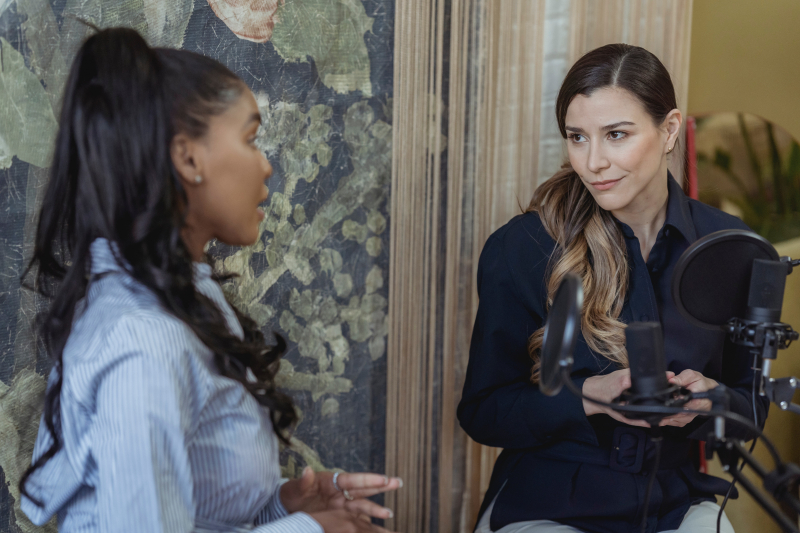Top 12 Most Asked Phone Interview Questions with Answers
To ensure that only exceptional candidates are invited for a face-to-face interview, a telephone interview is used. Simply put, you are being vetted before the ... read more...employer spends more time with you. To ensure that you advance to the following stages of the interview process, here are some of the most typical phone interview questions and their corresponding responses.
-
The hiring manager may ask you to "Tell me about yourself" at the beginning of an interview, whether it be in person, over the phone, or via video. They ask you this question so they can get to know you better as a candidate and see how you stand out from the competition.
Examine the job description first. Consider the abilities needed for the position and note any recent acts of yours that demonstrate them. To improve your storytelling skills for interviews, consider the STAR approach. To support your narrative, you can largely draw on recent professional experience, but you can also think back on earlier volunteer work and other pertinent events.
You can talk about your present position and how it relates to the open position. Explain how you are assuming additional responsibility in your current position if you are looking for a more senior position. Describe how your current talents transfer to the new position if you're switching to a role that requires different skills.
Example Answer:
I am a specialist in my sector, and I have the knowledge and expertise to benefit your business. I consistently succeed in my professional, personal, and academic endeavors. I have a great work ethic, and I always try to do my best for the business I work for.
Image by fauxels via pexels.com 
Image by Anna Shvets via pexels.com -
The hiring manager needs to know that you are aware of what you are getting into, thus, this is one of the most frequently asked phone interview questions with answers. If you can demonstrate that you have done your business homework and visited the firm's website, it's a good sign.
It's wise to research the organization you're interviewing with in advance. In addition to guiding the kinds of questions, you should ask during the meeting and, most importantly, giving you valuable insight into whether you think you would be a good fit for the company, the information you learn can assist you in answering their questions while keeping in mind their values, industry, and history. You should be able to find out more about the business and its target market by looking at its website, social media accounts, and any media mentions of its goods or services.
Example Answer:You command a devoted clientele and have a solid reputation for professionalism and good performance in your sector. Before applying, I did some research on the business and found a ton of glowing testimonials on your social media and internet presence from both clients and former workers. I want to work with and add value to the kind of organization that you are.

Image by Alex Green via pexels.com 
Image by Sora Shimazaki via pexels.com -
Provide a brief summary of your work history, citing your résumé, and mention any prior experience that contributed to the development of abilities relevant to this position. It is one of the most asked phone interview questions with answers. This question is routinely used by employers to gauge your current skill set. Outlining the abilities you acquired via your experiences will help you structure your response. Attempt to draw connections between these skills and the position for which you are applying.
Your main objective in responding to this question is to show how your prior experiences have equipped you for success in a new position. Try to downplay the distinctions between your present role and previous ones while you're talking about your experiences. Try to match your prior experiences by showing commonalities rather than focusing on discrepancies.Be as specific as you can while outlining your prior achievements. Employers may be more persuaded by your value if you provide specific examples of your professional successes. With this strategy, you can create a chance to discuss how those concrete experiences helped you become successful in a new position.
It can be beneficial to highlight your entire career trajectory and the objectives you have for yourself as you wrap up your response. When doing so, think about outlining how the position you are interviewing for fits into your career objectives. This might demonstrate your intentionality in choosing your route and your dedication to the industry you work in.Example Answer:
I have years of experience, considerable training in professional development, and a strong foundation in teamwork, organization, and leadership. My position-specific technical and hard abilities have also been continuously improved. I am a high-performing team player as a consequence, and I can provide consistent results and provide value to your business.

Image by cottonbro studio via pexels.com 
Image by Tima Miroshnichenko via pexels.com -
A good response describes your abilities and traits that, in light of the job description, make you the ideal applicant for f the most frequently asked phone interview questions and answers.
Everyone possesses a wide range of skills and qualities, but you must be picky when making your list of advantages. Just concentrate on those who have applied for the position. For instance, it would be inappropriate to bring up your graphic design experience during an interview for a position as an accounting clerk. Some interviewers will ask you to mention one strength, while others may ask you for several instances. Choosing one "biggest" strength and then two to three additional qualities you may give, if necessary, is the best approach to prepare. Strengths can be character- or skill-based. If you're giving several responses, it's a good idea to blend the two.
Example Answer:
My capacity to quickly pick up new knowledge and abilities is by far my strongest attribute. This helps me when I start a new role since I can rapidly learn about the company, its processes, policies, and standards and start contributing. As I encounter a new obstacle in my profession, it also enables me to continuously learn and build new skills on a regular basis.

Image by Tima Miroshnichenko via pexels.com 
Image by Sora Shimazaki via pexels.com -
This is one of the most frequently asked interview questions, and the greatest responses demonstrate communication skills and the capacity to collaborate effectively with others to advance the company's objectives. Having the necessary talents alone is insufficient since you also need to get along with others.
Provide reasons why you believe teamwork is crucial in your response to demonstrate to interviewers that you appreciate it. Employers and team members can both profit from teamwork. Here are some particular benefits you might emphasize:
- Teams can reach their goals and advance the company's objectives more quickly when there is cooperation. Individual team members can offer their skills and experience to the team's goal-achieving efforts.
- Team members can share ideas, collaborate to solve problems, and equally split the burden thanks to the leadership of the group.
- Working together supports team members and can keep team morale high. Group brainstorming increases innovation inside the team.
Anecdotes are excellent for demonstrating your teamwork abilities and experiences. You could discuss a team project you participated in and its fruitful results with the interviewer. Even if your team didn't succeed in achieving the main objective, you might have learned a new skill, made new contacts in the business world, or overcome difficulties.
Example Answer:
I noticed one of my team members was having trouble keeping up when we were working on a project as a team. They were fresh to the software, but I had experience, I discovered. I made plans to provide them with individualized tutoring for a week by showing up an hour early. This allowed us to make up for lost project time and complete the task successfully.

Image by MART PRODUCTION via pexels.com 
Image by George Milton via pexels.com -
When questioned about your flaws in a job interview, you might change the subject and talk about the efforts you're taking to strengthen that area and make it a strength. That is one of the most asked phone interview questions with answers. You could wish to mention the following flaws in your interview:
- Getting caught up in details
- Unable to let go of projects
- Trouble saying “no” to others
- Managing missed deadlines
- Little experience in certain areas
- Lacking confidence at times
- Difficulty asking for help
- Working with certain personalities
- Maintaining a work-life balance
- Requiring specificity
It's natural to feel hesitant about declaring something complete or giving it to another team for further action after investing time and effort in it. There is always space for improvement, and some people have a propensity for harsh criticism or hurried revisions that endanger the deadline. If you admit that this is a weakness of yours, explain how you're working to overcome it by setting a deadline for all revisions and being proactive in making adjustments rather than waiting until the last minute:Example Answer:
"My worst flaw is that I sometimes find it difficult to let go of a project. The harshest critic of my work is myself. I'm always able to identify something that needs to be altered or improved. I set revision deadlines for myself in an effort to help myself get better at this. By doing this, I can avoid making last-minute alterations.
Image by Tima Miroshnichenko via pexels.com 
Image by fauxels via pexels.com -
You have the opportunity to demonstrate that you are a fantastic fit and merit moving forward in the hiring process. Delivering the correct response requires the usage of the SMART technique.
Review the job posting and make notes to grasp the exact abilities, traits, and experience companies are seeking in a candidate. Pay close attention to the "Requirements," "Experience," and "Education" areas of the job description. Look for connections between the talents, experiences, and traits the business is seeking and what you have to give if hired.
Why should we hire you? can be answered by taking the time to understand the company's mission, goals, and most recent announcements. With this knowledge, you should discuss how you share their values and how you might be able to assist them in achieving their main business objectives.
Describe how, in relation to the organization and position for which you are seeking, your experience, talents, and traits make you the best candidate for the job. Each of the specifications stated in the job description should be addressed, along with any other qualifications that make you a fantastic fit.Where possible, include numbers to back up your successes. For instance, if you're seeking for a position as an accountant at a business that needs someone to improve workflow, you may mention that at your previous employer, you introduced a new procedure for expense accounts that cut down time-to-reimbursement by 25%.
Example Answer:
I am the best candidate because I possess the abilities required to succeed in this role. I have a strong work ethic, a positive outlook, and a history of success. I am the kind of person who will be a responsible role model for your business and is conscientious.

Image by Sora Shimazaki via pexels.com 
Image by fauxels via pexels.com -
Explaining how leaving your present workplace fits into your career aspirations is crucial when responding to this question. Never be critical of your current employer. Even better would be if you sought to work with the company before quitting and spoke with your employer before doing so. Employers desire someone who will be dependable because it costs money to hire and train new employees.
You don't have to go into great depth while responding to this question. There are always ways to express your dissatisfaction with your current job without criticizing your employer (tips on this below). Move the topic back to why you are enthusiastic about the prospects ahead of you by keeping your response brief and focused.
It's crucial to remember that the company you're interviewing with might get in touch with your former employer, so anything you say should align with what they find out in those interactions. Be open and honest about your employment status as well. If you gave incorrect information, it can affect your chances of receiving the offer if they call your former employer to check start dates, and pay ranges, or to obtain a reference.
Example Answer:
I want a new challenge that will put my abilities to good use, hence I want to leave my current job. Although my employer did an excellent job of preparing me, I'm searching for a new challenge. Although I have discussed my options with my job, the company's narrow development path, unfortunately, diverges from my professional objectives.
Image by fauxels via pexels.com 
Image by MART PRODUCTION via pexels.com -
Explaining the qualities of your current position that fit the needs of this particular role is a fantastic method to respond to this inquiry. Consider the responsibilities and duties you provided in the work experience part of your resume as you get ready to respond to the interview question. Your interviewers might have previously seen the responsibilities specified in your CV if you gave it to the hiring manager beforehand. As a result, they might be expecting you to go into more detail about these duties during the interview.
You can start detailing your duties and obligations to the interviewers once you have a clear understanding of the ones listed on your CV. Attempt to recall the duties outlined in the job description and make connections between your present duties and those described in the posting.You should be able to demonstrate how you utilized your abilities and credentials to carry out your obligations when you describe your job responsibilities. You can describe the talents you used to complete a certain activity or project. You may, for instance, describe how you worked with clients on a daily basis to satisfy their needs and address any questions they had.
Example Answer:
In my current position, I support my team by completing my assignments on time and making sure they have all they need from me. In accordance with the aims and objectives of my team and the firm, I work from prioritized to-do lists and always perform the most crucial activities first. I constantly seek out chances to learn, grow, and challenge myself. I also relish chances to collaborate with other teams and instruct and guide new employees.

Image by Yan Krukau via pexels.com 
Image by fauxels via pexels.com -
Show that you have a good reason for wanting this particular job and that you are a great fit for the position based on your experience, abilities, and desire. Show that you will stay with the organization for a long time as well.
By preparing for this question prior to the interview, you'll be able to respond to the hiring manager's query quickly and professionally. You must first comprehend the position's responsibilities in order to formulate a response. It is a good idea to read the job description in its entirety before the interview. Will you be interacting with customers? Are you going to be in charge of accounting-related duties? This information is crucial for understanding which of your qualifications are most pertinent to the position and for effectively expressing your reasons for applying for it.
Example Answer:
I made a brief list of the qualities I was looking for in an employee, and your business was at the top of the list. I was thrilled to learn that my talents, experiences, and professional goals perfectly complement this opportunity. It will present a challenge where I can put my abilities to good use and continue to advance professionally for a considerable amount of time.

Image by Tima Miroshnichenko via pexels.com 
Image by Tima Miroshnichenko via pexels.com -
You should normally think about how the particular function could aid in your professional development as you write your response. Here are some things to think about when composing your response in light of that. Always read the job description thoroughly before writing your response. Think about the talents and characteristics that are necessary for the job that you already possess, and would like to develop, as well as any areas where you would like to obtain experience. It can be beneficial to consider the specifics of the position's requirements and what it would mean to gain more knowledge and experience in these areas over the following five years.
It may take you several years to become an expert in the position you're interviewing for if you want to concentrate on a particular area of interest. A cosmetologist, for instance, might be curious about developing customer relationships and finding out what technology other companies use to do so. They might attempt to learn more about marketing communications and customer relationship management software as a result. Thinking carefully about tasks, other related abilities, and topics that interest you might help you develop ideas about where you envision yourself in five years.
Example Answer:
I'd like to think that I'll still be working for you and, ideally, with more responsibilities. I'll have finished a lot of training and development programs. My ambition is to be developing with the business in five years, to be a trustworthy worker, and to be able to mentor more junior team members.
Image by Antoni Shkraba via pexels.com 
Image by Vojtech Okenka via pexels.com -
The more accurately and honestly you can respond to this question, the higher your chances are of finding a rewarding job where you can excel. Your preferred work atmosphere is your ideal working environment. Each has a different view of the ideal workplace due to the many elements that go into creating an atmosphere. The following factors could have an impact on how you define your ideal workplace: Work-life balance, training programs, access to facilities, physical workplace and office building architecture, employee recognition, and management style are all factors that affect employee relations.
Employers are seeking a response to this query that complements what their company has to offer. Additionally, they demand an open and assured response. Maintaining honesty and truthfulness about your ideal working environment can help you locate a job you can excel in.
Example Answer:
I want to work in an environment where everyone has an equal chance to advance and succeed. I want to work in a great team setting where everyone supports one another and where creativity is rewarded. Also, I look for effective leadership where productivity is appreciated and goals and objectives are clear.
Image by fauxels via pexels.com 
Image by fauxels via pexels.com

































